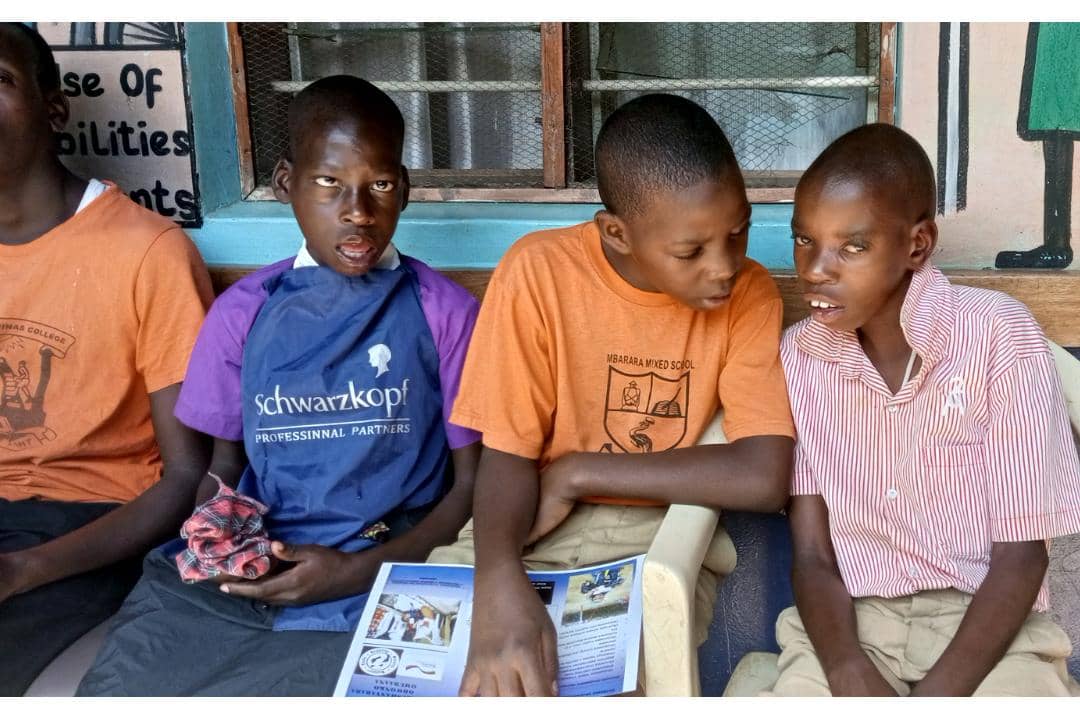Hudson Mugisha has six children and lives in Kawube Zone Busabala, Makindye Ssabagabo. His fifth child Isaac, a seven year old, has a neuro brain development.
Isaac Mugisha was born in 2017 with a neurodisability. His father began noticing unexplained changes, such as uncontrollable crying and violent behavior. However, a subsequent check-up by health workers revealed that the baby had cerebral palsy, a condition he had never heard of before. Although episodes of malaria had decreased, “three months later, I learned that Isaac had a brain disability. I was bewildered, broken, and devastated by the news,” Hudson recounts.
Cerebral palsy (CP) is a group of neurological disorders that affect movement, balance, and posture. Symptoms vary by person and over time, but can include poor coordination, weak muscles, stiff muscles, and tremors. People with CP may also have problems with sensation, vision, hearing, and speech. According to a 2015 research, cerebral palsy prevalence in Uganda was 2.7 per 1000 children.
The health workers explained that Isaac’s growth and development would not be like that of a typical child and that his condition was unlikely to change anytime soon. This realization made Hudson aware that Isaac’s moods could change swiftly; for example, his temper was unpredictable, and he could lose his emotions very quickly. Hudson believed that understanding Isaac’s changes was essential and that he needed to adapt to what he learned. This situation mentally prepared him for the challenges ahead.

Mugisha acknowledges that he did not feel the pain right away. The situation led him to reflect on all his sons. His firstborn died when he was just twenty-one days old, followed by Isaac, who was diagnosed with cerebral palsy. His third son often falls ill, though he has no specific disease. The last three children are healthy. This situation made Mugisha contemplate, “The person who bewitched us did it so well. How do I navigate all these challenges?” he added
In the first three years of their marriage, Hudson and the wife lived together happily. However, Isaac’s condition changed the dynamics between him and his wife. He said, “Every time I glanced at my wife, I could see that she was not happy with me or the child. Carrying him every day became unbearable for her, and the pain of caring for a sick child tortured her”.
Eventually, the mother called me while I was in Mbarara to inform me that she was leaving. Mugisha asked his wife why she was leaving. She replied, “I left your son locked in the house. Please ensure you find your way back home. I am done with this relationship.” Without hesitation, I boarded a bus from Mbarara to Kampala to find my boy.
Mugisha recalls upon arriving home, he found Isaac alone in the house. He said to him , “from this moment on, I am both your mother and father for eternity. Your mummy, abandoned us for good. I will stand by you”.
Through attending group meetings at Ubuntu, a community-based program led by health workers and expert parents of children with neurodisabilities, Mugisha’s life began to change gradually. Ubuntu provides the emotional and practical support caregivers need to maximize child development.
“I have been taught how to feed my Isaac and how to prepare his food using a wooden stick or a blender in that, he will not vomit back,” he says. Isaac enjoys eating fresh fish, sweet potatoes mixed with pumpkin. He also enjoys cassava porridge since it cools faster. “I assumed all the responsibility of taking care of Isaac including travelling with him everywhere.”
For many years, women have been at the forefront of caring for children in Africa. Mugisha is one of the many men who have taken full responsibility of looking after Isaac. Men can care too about children’s impairment! Women are swift in their work, and similarly, Mugisha has mastered the art of multitasking-doing several tasks at once. “I prepare and sort the medicines, then give them to Isaac to swallow. This is done on a routine schedule,” he explains.
Growing up, Mugisha did not prioritize keeping time, but nowadays, it’s essential in caring for Isaac. The world shapes us, and for me, it has been for the better. My experiences have molded me into a man; for example, Isaac is now programmed to stand, sit, and sleep at specific times. If he is to achieve his milestones, this routine is crucial. I focus on small milestones rather than just overall development, and that brings me joy as a father. I feel like an achiever in this journey!
Mugisha admitted that men often struggle with patience. Reflecting on his early years with Isaac, he says, “I was harsh and would slap him, which made communication between us difficult.” Baby Ubuntu in conjunction with Family Foundation (CFU), conduct educational sessions on nutrition, positioning, and communication, which helped Mugisha better understand and accept Isaac’s condition, management, and how to adapt to their environment. He adds, “When I started attending these sessions and met other parents, I learned through health education that involuntary actions, like peeing, are not intentional. The trainers with Ubuntu taught him how to start conversation with the child.

Previously, Mugisha held several part-time jobs, including construction electrician and social worker, working for various employers. These jobs were offered on an as-need basis. However, with Isaac’s condition, he found it increasingly difficult to manage all these jobs, especially when they were not his primary responsibilities. So balancing everything became extremely challenging because he was essentially an employee.
Sooner he realized, “I am a problem whenever I ask for time off to attend to my son.” He decided to pursue self-employment instead of part-time work, saying, “I have skills in making and mending shoes. I can work for a short time and then return to care for Isaac.
It has been difficult for him to propose to a woman for her hand in marriage. “It’s not easy for me to invite another woman to stay with me. I have no plans to remarry; I have accepted my life with my son and not with another woman. I feel content focusing on caring for my child”, he concludes.
Rebecca Birungi is a Journalist




